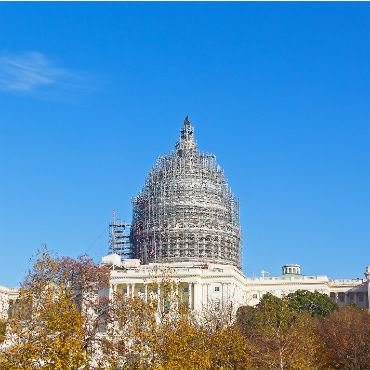Congressman wants answers on State's security culture
The FBI closed its case against Hillary Clinton, but many on Capitol Hill still have questions.

FBI Director Jim Comey may have closed his case on presidential candidate Hillary Clinton and her private email server, but many in Congress still have questions.
In a letter addressed to Secretary of State John Kerry, Attorney General Loretta Lynch and Director of National Intelligence James Clapper, Rep. Mike Pompeo (R-Kan.) wants more information on what Comey characterized as a "lax security culture" at the State Department, and stated that an immediate review of Clinton and other top State officials was "critical."
Pompeo asked if any of these officials will face sanctions for their mishandling of classified information, and asked Kerry what steps he has taken and plans to take to tighten the security at the department. He requested answers to these questions by July 22.
Pompeo added that he believed Clinton should be excluded from the upcoming classified briefings of the presidential nominees. Other members have made similar requests, including House Speaker Paul Ryan.
Comey endured a four-hour hearing before the House Oversight and Government Reform Committee on July 8. In that appearance, committee Chairman Jason Chaffetz (R-Utah) indicated that Congress would submit a referral to the FBI for a perjury probe. Chaffetz and others want Clinton's congressional testimony on her private email server cross-checked against her statements to the FBI.
Additionally, Clinton's previous statement affirming State's authorization of her use of a private e-mail server for government activities was refuted by the State Department watchdogs at a second panel of the July 8 hearing.
In March 2015, Clinton publicly stated, "I opted for convenience to use my personal e-mail account, which was allowed by the State Department… The laws and regulations in effect when I was Secretary of State allowed me to use my e-mail for work. That is undisputed."
However, State Department Inspector General Steve Linick and assistant IG for Evaluations and Special Projects Jennifer Costello testified that this use is, in fact, disputed by State officials interview by OIG.
Linick said, "Our report said she did not have approval from senior officials in the department, and we don't believe it was permitted both under the rules, and none of the senior officials who were there at the time gave her approval or were even aware that she had a server."
Costello echoed the sentiment that Clinton never received approval to exclusively use personal e-mail for official business.
"The reason we know this is because the officials we interviewed at the department, both in the office of diplomatic security and in the office of information resource management, told us that," she said. "And in telling us that, they were relying on a department policy that was put in place in 2005, which says that day-to-day operations must be conducted – I'm paraphrasing -- on authorized information systems. And so the implication there is any exclusive use would be a day-to-day operation, and shouldn't occur without approval."
Additionally, Costello confirmed that, in order to fully comply with federal regulations, Clinton would have needed to turn over printed copies of e-mails.
"During her tenure, folks in the office of the secretary, in order to comply with email records preservation and management policies of the department, needed to print and file those e-mails," said Costello.
However, Costello said because Clinton never provided those printed e-mail copies, they would be available only "to the extent that other folks who Secretary Clinton emailed" did print and file them.
As a result, Costello continued, of the tens of thousands of e-mails in question, only "few here and there" exist in the department, though she could not provide a specific estimate as to precisely how many.
NEXT STORY: Would a Uniform Digital ID Work in the US?





